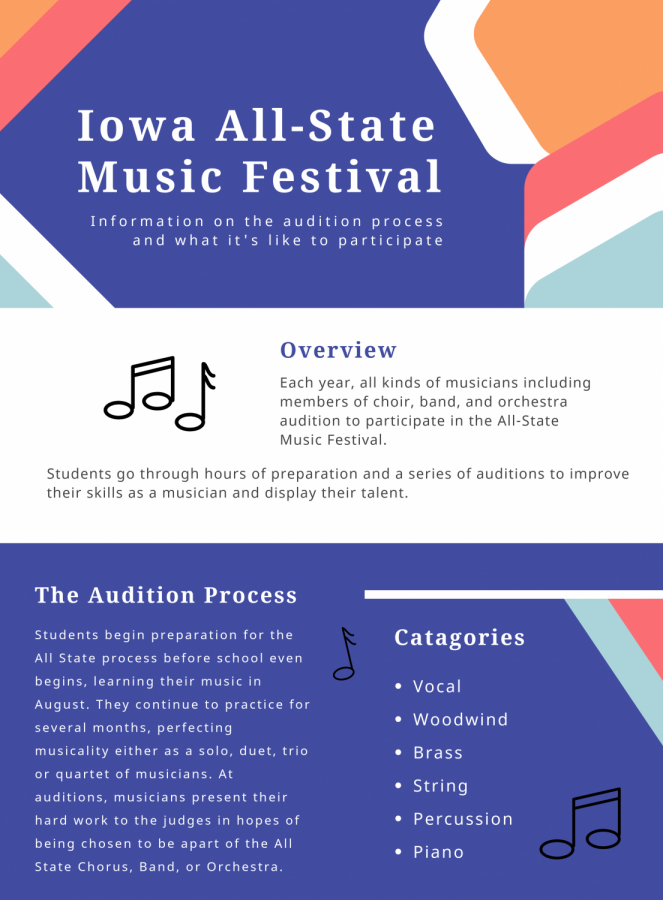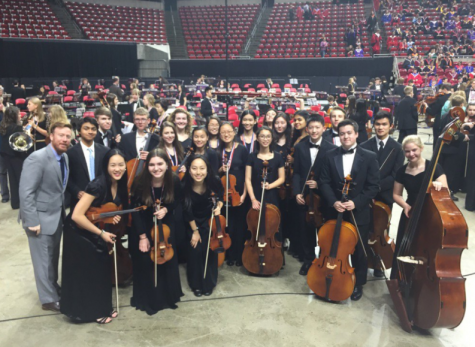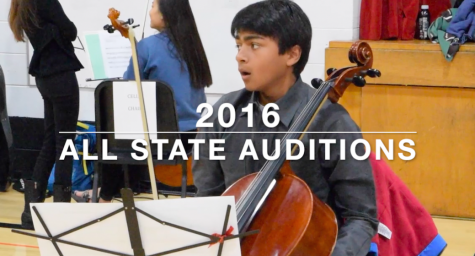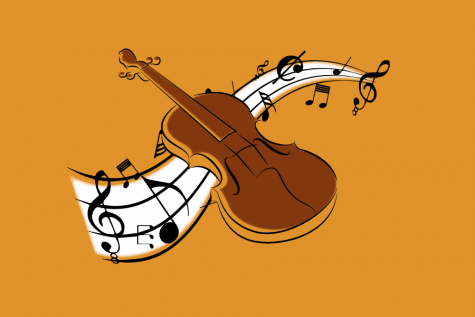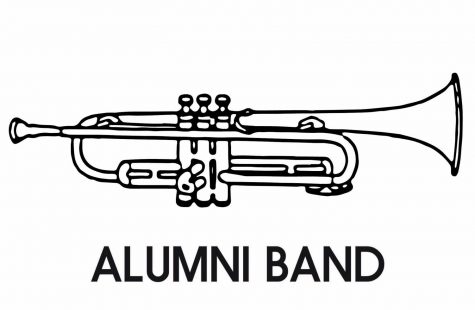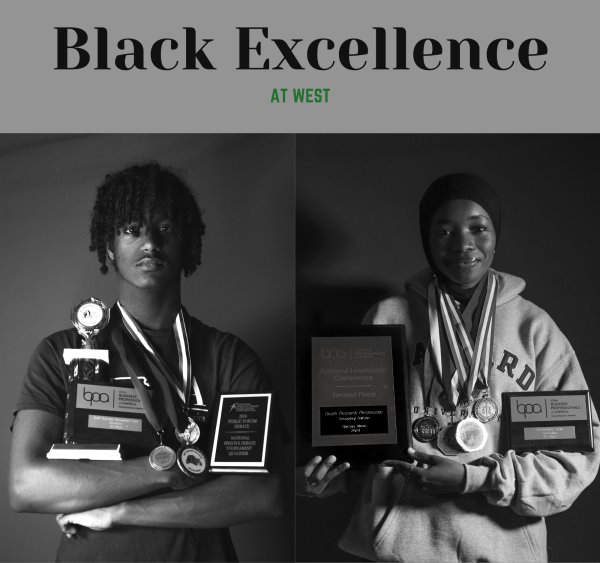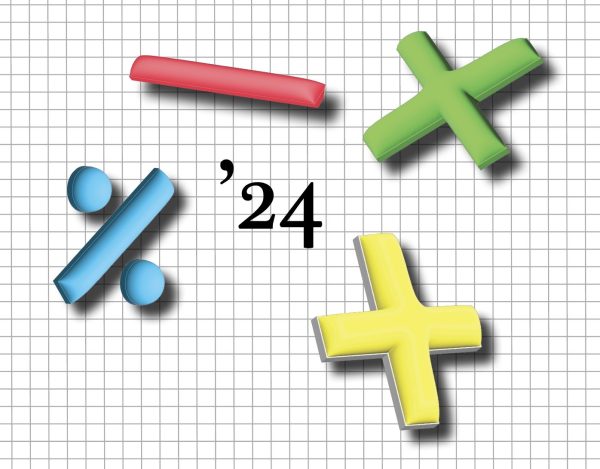All-State auditions showcase students’ hard work
After practicing for months, students trying out for All-State head to Washington, Iowa to audition on Oct. 20, 2018.
Auditions are stressful, whether they’re for sports, music or acting. There is always so much riding on how well you do at a certain time. If you make a mistake you might not get in. For West High students auditioning for All-State, the pressure increases. Not only do they have to get through one audition, but often they have to pre-audition at West to even be able to audition for real.
To get in, students begin practicing as early as the end of July when the audition material is published. The audition material includes excerpts from etudes and full pieces, a few scales and a solo piece of the student’s choosing for orchestra and band. For choir they have five songs that they sing as a quartet.
Paras Bassuk ‘21 is one of many students auditioning for All-State this year.
“[Practicing has] been a big time commitment, but I’ve enjoyed it. I think I’ve learned a lot,” Bassuk said. “I’ve been practicing every day in the morning before school and pretty consistently going in to visit with Mr. Welch, [and I] go over the material with my teacher as well. I’ve been working pretty diligently.”
Bassuk plays the bass in Symphony Orchestra. Last year, Bassuk auditioned for All-State for percussion. This year, he decided to audition for bass.
“I’ve been fortunate to have been playing bass for quite a while. I got a lot of encouragement from my family and my friends and Mr. Welch. So yeah, I thought I would try it out,” said Bassuk.
Ava Ferrel ‘21 and Margaret Penning ’21 are auditioning for All-State for choir. Like Bassuk, they practice as often as possible.
“There’s practice before school, during AFT, with your quartets, over the weekends. There is a lot of practicing,” Ferrel said.
“[You have] to know all your notes and be able to find them within the other people in your quartet,” Penning said.
Emma Gehlbach ‘19 is also auditioning for All-State. She got into All-State for clarinet her first three years of high school. She plays the clarinet in wind ensemble.
“If all goes well Saturday, I’ll be a four year All-Stater,” Gehlbach said.
Gehlbach auditioned for All-State because of her love for music.
“In junior high I had participated in honor bands and I really liked music. So I was excited at the opportunity to play at a higher level than I ever had before and improve as a musician because of that. It ended up being a really fun experience,” Gehlbach explained.
Gehlbach starting practicing All-State music in the summer, though she made sure to pace herself when learning the music.
“I’ve been kind of slowly … working the music up because if you do too much too fast, you might over practice and get sloppy. So the trick is to get to the point where like a week before the auditions, you’re polishing–making your final touches, making sure you’re solid and consistent so that you can perform well under pressure when things might not go your way,” Gehlbach said.
However, finding the time to practice is quite difficult, especially if there’s other extracurriculars.
“I run cross country and that’s a big time commitment,” Gehlbach said. “Practices last anywhere from an hour and a half to two and a half hours, six days a week. So during cross country season it’s a lot harder to practice and unfortunately that falls at the same time of All-State preparation. I’m forced to do a lot of practicing on weekends during the fall, but then cross country ends a couple weeks before All-State auditions. That’s kind of when I crack down [on music.]”
It’s almost expected that you’re going to make it again. It’s hard mentally when you hear other people practicing and if they sound amazing, it makes you nervous because that’s one less spot for you.
— Emma Gehlbach '19
The pressure to get into All-State is very high for students, especially for those who have earned spots in previous years.
“It’s almost expected that you’re going to make it again,” Gehlbach said. “It’s hard mentally when you hear other people practicing and if they sound amazing, it makes you nervous because that’s one less spot for you.”
Standing out from other competitors is crucial to getting in.
“[It’s important to] find ways to differentiate yourself from the other people trying out because there are so many … talented people at All-State that you have to find a way to stand out from the rest of them and leave an impression on the judges,” Gehlbach said.
The auditions themselves can be quite nerve-wracking because there’s so much riding on one audition.
“It’s very hard for some people to perform well under pressure. Nerves can make your hands cold and can make it hard to focus on what you’re trying to do. It’s easy to rush when you’re nervous, [easy to] not take deep enough breaths to get through the line. So it’s a learning process, learning how to deal with your nerves,” Gehlbach said.
All-State only allows 30 students from band and orchestra and 28 from choir to audition from each school. For most schools this is not a problem, but West normally needs pre-auditions held by music directors to get down to the maximum number of students auditioning from each school. Usually, the alloted spots are filled by upperclassmen.
The students that make it through the pre-auditions have the official auditions on Oct. 20, 2018 at Washington High school in Washington, Iowa.
“[Auditions] pretty much take the whole day. You get there and you audition. There are lots of other people that audition too … There is a lot of waiting around,” Bassuk said.
Once everyone has auditioned they announce recall auditions.
“What’s different about the band process from the orchestra and choir process is that if you’re not recalled for band, you’re probably not going to make it,” Gehlbach said. “Versus with orchestra and choir, it’s different because a recall could be a good thing or a bad thing. Like if your audition went really well and you’re not recalled that’s probably because you already got in. [Or] a recall could mean that you’re on the edge and you could either make it or not make it depending on how your recall audition goes.”
After recalls, there’s a few hours before they announce the results. Waiting is difficult, but when the final results go up, it’s even worse.
“I think [waiting is] probably the hardest part just because there’s so many people who are like ‘Oh my gosh I got in’ and then there’s so many people who go and cry and it’s so emotional even if you yourself don’t care. There’s just so many emotions around you,” Ferrel said.
There’s so many people who are like ‘Oh my gosh I got in’ and then there’s so many people who go and cry and it’s so emotional even if you yourself don’t care. There’s just so many emotions around you.
— Ava Ferrel '21
The students that do make it into All-State have a few weeks to learn the full repertoire for the All-State Musical Festival. The All-State Festival starts on Nov. 15, 2018 and ends on Nov. 17, 2018.
“You get [to the festival] on Thursday night and you do your chair auditions, find out your chair placement, then you practice all day Friday and a lot of the day on Saturday,” Gehlbach said. “The concert is on Saturday night, so that’s really only like a day and a half of rehearsal to prepare really difficult pieces, but the expectation is that you practice them on your own, so [the ensemble] can spend more time working on the musical aspect than necessarily the technical aspect of playing those pieces.”
Your donation will support the student journalists of West High School. Your contribution will allow us to purchase Scholarship Yearbooks, newsroom equipment and cover our annual website hosting costs.
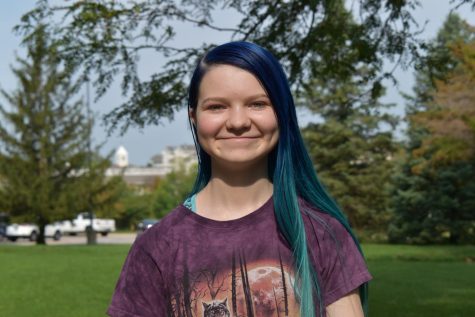
(she/her) Bess Frerichs is the online managing and feature editor. As a senior, this is her third and final year on staff. She enjoys reading, writing...
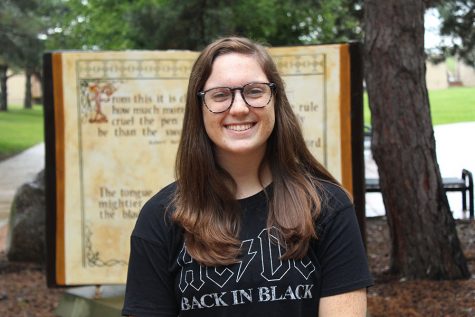
Sidney Kiersch is a senior and this is her first year on staff as an online graphic designer. Sidney is involved in choir, show choir and theater at West...



